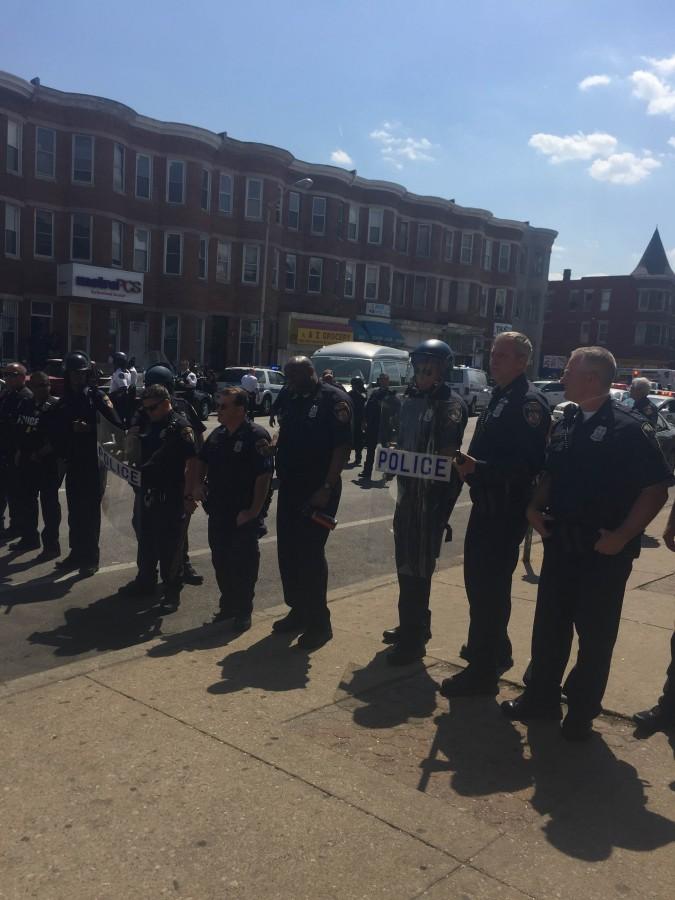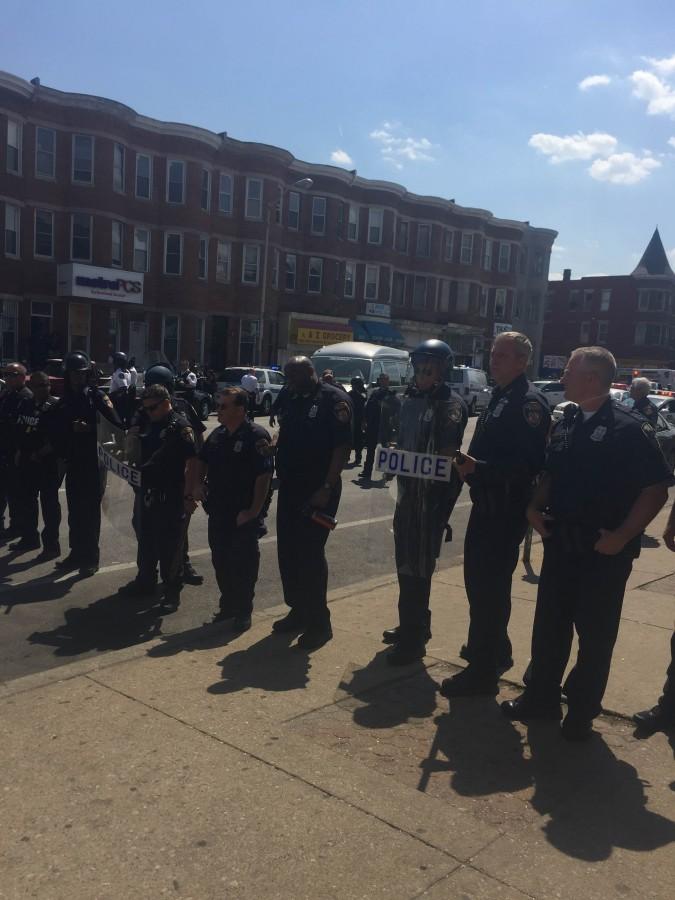Baltimore Protests: Death of Freddie Gray in police custody ignites demonstrations affecting lives
As the city of Baltimore heals from unrest from last month, and six officers are charged for the death of Freddie Gray, Attorney General Loretta E. Lynch begins a federal investigation for civil rights violations committed by the Baltimore Police department.
Foreign affairs correspondent for McClatchy Newspaper, Hannah Allam, was covering events in Baltimore. Allam will be speaking at the Class of 2015 Graduation.
“I have been a correspondent in a war zone for many years and some of the parallels that I saw in Baltimore were chilling,” she said. “You could see the years of neglect, disenfranchisement, cycles of poverty and violence that have very, very deep roots, and you can see that correcting this and putting out the flames is going to be a really big task, and we have to see which Baltimore leaders are up for that, and that’s what residents have told me these past few days.”
On the morning of April 12, Lt. Brian W. Rice, Officer Edward M. Nero, and Officer Garrett E. Miller apprehended 25-year-old African-American Freddie Gray and injured his back while holding him facedown. After finding that he had a folding knife in his possession, they charged him with illegally carrying a concealed weapon. He was placed into a police van laying down, without a seatbelt, which breaks departmental regulations. While driving him to the Western District Police Station, they made multiple stops. His back injury worsened, and despite Gray requesting, the police officers gave him no medical attention. They discovered that he was no longer breathing upon arriving at the police station. He died a week later in the University of Maryland’s Shock Trauma Center.
Gray’s death sparked protests in Baltimore. Baltimore Mayor Stephanie Rawlings-Blake instituted a curfew on the city from April 14 to May 3.
Allam compared her experiences covering the Iraq War in Baghdad to the Baltimore circumstances.
“I don’t have to go all the way to Baghdad to write about the issues that I usually write about in foreign countries—corruption, explosions, violence, lack of education, all the social ills that I’ve associated with in the developing world, are some things I have witnessed,” she said.
The conditions that the residents of Baltimore faced, according to Allam, emphasized their own personal strength.
“One thing that stood out to me was the resilience of the residents in those neighborhoods,” she said. “It just reminded me of how Iraqis or Syrians or Egyptians who lived through so many years of hardship could still maintain a sense of humor and compassion and just go about their lives. ”
Harker alumnus Rohith Bhethanabotla (‘14), a freshman at Johns Hopkins University (JHU) in Baltimore, commented on how the school has been impacted by the city’s unrest.
“Baltimore is a city I’ve come to love with its leafy neighborhoods and quaint townhouses, but every night when you look up in the sky and see the police helicopter doing its rounds or when you walk down the street and an ambulance races by, it makes me sad sometimes knowing that my city — my home — is deeply troubled,” he said.
Due to riots by teenagers near the campus, students were not allowed to enter buildings after 8:00 p.m. and cross streets after 10:00 p.m. Additionally, classes were canceled for one day.
“The curfew was tough to deal with, because a lot of campus life does happen at night from studying to parties to simple late night fast food runs” he said in an email interview. “We had to make a lot of changes to plans for group projects and social events.”
Bhethanabotla also discussed usage of Yik Yak, a social media app which allows people to post anonymous messages to others in their proximity.
“There were a lot of racist posts about black people that were promptly down-voted when it appeared on the feed” he said. “But seeing them get posted though made me more aware that I am a minority on campus and that cultural acceptance is not entirely as fluid as I had imagined it was at JHU.”
This piece was originally published in the pages of The Winged Post on May 13, 2015.
Meena Gudapati (12) is the Editor-in-Chief of Harker Aquila. Her favorite part of journalism is making her humorous podcast "Get Skool'd" and writing interesting...
Maya Kumar (11) is the Features Editor for the Winged Post. This is her third year in Journalism and her favorite part is collaborating with fellow journalism...


















![“[Building nerf blasters] became this outlet of creativity for me that hasn't been matched by anything else. The process [of] making a build complete to your desire is such a painstakingly difficult process, but I've had to learn from [the skills needed from] soldering to proper painting. There's so many different options for everything, if you think about it, it exists. The best part is [that] if it doesn't exist, you can build it yourself," Ishaan Parate said.](https://harkeraquila.com/wp-content/uploads/2022/08/DSC_8149-900x604.jpg)




![“When I came into high school, I was ready to be a follower. But DECA was a game changer for me. It helped me overcome my fear of public speaking, and it's played such a major role in who I've become today. To be able to successfully lead a chapter of 150 students, an officer team and be one of the upperclassmen I once really admired is something I'm [really] proud of,” Anvitha Tummala ('21) said.](https://harkeraquila.com/wp-content/uploads/2021/07/Screen-Shot-2021-07-25-at-9.50.05-AM-900x594.png)







![“I think getting up in the morning and having a sense of purpose [is exciting]. I think without a certain amount of drive, life is kind of obsolete and mundane, and I think having that every single day is what makes each day unique and kind of makes life exciting,” Neymika Jain (12) said.](https://harkeraquila.com/wp-content/uploads/2017/06/Screen-Shot-2017-06-03-at-4.54.16-PM.png)








![“My slogan is ‘slow feet, don’t eat, and I’m hungry.’ You need to run fast to get where you are–you aren't going to get those championships if you aren't fast,” Angel Cervantes (12) said. “I want to do well in school on my tests and in track and win championships for my team. I live by that, [and] I can do that anywhere: in the classroom or on the field.”](https://harkeraquila.com/wp-content/uploads/2018/06/DSC5146-900x601.jpg)
![“[Volleyball has] taught me how to fall correctly, and another thing it taught is that you don’t have to be the best at something to be good at it. If you just hit the ball in a smart way, then it still scores points and you’re good at it. You could be a background player and still make a much bigger impact on the team than you would think,” Anya Gert (’20) said.](https://harkeraquila.com/wp-content/uploads/2020/06/AnnaGert_JinTuan_HoHPhotoEdited-600x900.jpeg)

![“I'm not nearly there yet, but [my confidence has] definitely been getting better since I was pretty shy and timid coming into Harker my freshman year. I know that there's a lot of people that are really confident in what they do, and I really admire them. Everyone's so driven and that has really pushed me to kind of try to find my own place in high school and be more confident,” Alyssa Huang (’20) said.](https://harkeraquila.com/wp-content/uploads/2020/06/AlyssaHuang_EmilyChen_HoHPhoto-900x749.jpeg)




